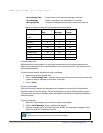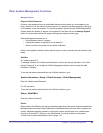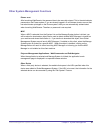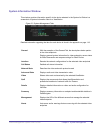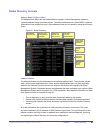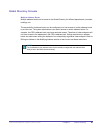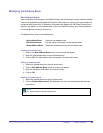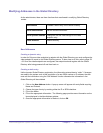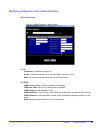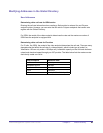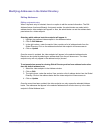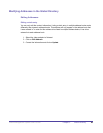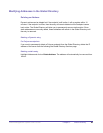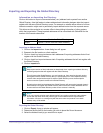
43Chapter 3 Global DirectoryGlobal Management System User’s Guide
Modifying Addresses in the Global Directory
Modifying addresses in the Global Directory works differently with dynamic entries, static entries
and replicated entries. Polycom video endpoints that automatically register their addresses into
the Global Directory are dynamic entries. Static entries are addresses that are manually entered
into the Global Directory.
Dynamic entries
Dynamic entries are Polycom video endpoint addresses that register automatically with the
Global Directory. Polycom video endpoints register with the server every ten minutes. So
depending on the state of the endpoint, dynamic entries will appear or disappear from the
endpoint’s view of the Global Directory. A dynamic entry for an endpoint can occur only if the
endpoint is congured to report to the server. If the server’s IP address is not entered in the
appropriate eld when setting up the endpoint, auto registration will not occur.
The information corresponding with a dynamic entry is supplied by the endpoint conguration.
You cannot delete dynamic entries but the endpoint will reappear unless it is permanently
removed by unregistering the endpoint.
Static entries
A static address is a record that is manually entered into the Global Directory. Static addresses
are for video endpoints that cannot register with the server. Devices not located on the LAN
and require manual entry can be entered into the Global Directory through the static entry
mechanism. Static entries will remain in the Global Directory until it is removed.
Replicated entries
Replicated entries, designated with by a blue booklet, are video endpoint entries that have been
replicated through Lightweight Directory Access Protocol (LDAP) or Internet Locator Server
(ILS). When the replication of different Global Management System directories occur, auto
registered video endpoints and manually entered systems contained in the default address
books are replicated to and from each server. As a result, entries from Directory A’s default
address book will appear in Directory B’s default address book and vice versa. Note that entries
contained in address books other than the designated default will not be replicated.
Although you can select a replicated entry in the Global Directory and can click on Edit Address,
these entries cannot be edited. However, the specics of a replicated system are detailed when
Edit Address is performed.
Global Directory will also permit you to delete a replicated entry. However, deleting a replicated
entry is useless because the deleted replicated entry will reappear during the next replication
cycle.



